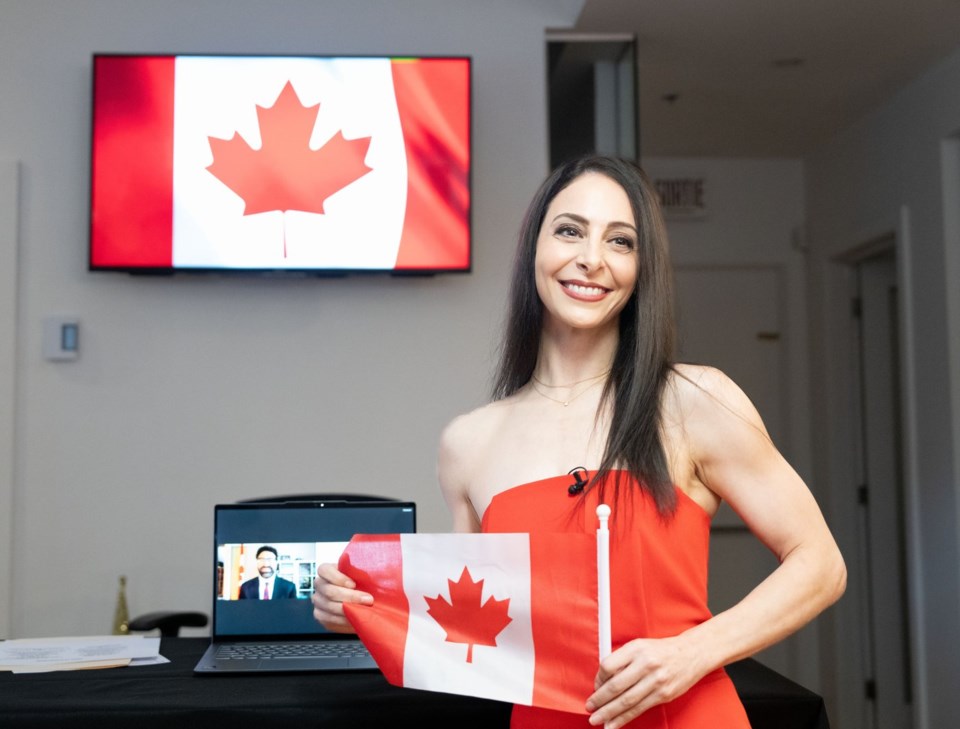LAVAL, Que. — Deanna Stellato-Dudek feels like a new woman since gaining Canadian citizenship.
“Every day since I’ve felt like a champion,” the U.S.-born Stellato-Dudek said Thursday at Place Bell. “That feeling just hasn’t left me, and it’s something that I hope stays with me all the way through the Olympics in 2026.”
The world champion pairs skater, who has lived in the Montreal area since 2019, took the oath of citizenship on Dec. 11, making her eligible to compete for Canada at the Olympic Games.
Stellato-Dudek, 41, will skate in her first competition as a Canadian citizen this weekend in Laval.
She and partner Maxime Deschamps are aiming for a third consecutive title at the Canadian figure skating championship, starting with Friday’s short program.
And the new Canadian says she feels lighter and more powerful.
“I don't know if it's like a weight off my shoulders or what,” Stellato-Dudek said. “But I have just felt internally like such a huge ignited fire, such a belief and possibility that this crazy, wild dream I have, it can actually happen now.
“That's the best way I can put it, I've just felt like a champion from that day forward."
The feelings remain strong despite Deschamps’s serious illness, which has kept the duo off the competition ice since Nov. 17.
The 32-year-old from Vaudreuil-Dorion, Que., lost 10 pounds during a four-day fever, forcing them to withdraw from the Grand Prix Final in December.
“We did every possible thing we could,” Stellato-Dudek said. “There's no ice in Quebec on the weekends, because it's all for hockey, but we found ice at 10 o'clock at night Saturday and Sunday to try to go skate, to see if he could do it.
“Wasn't happening. At that point it's a safety aspect, right? I mean, he's holding my life in his hands, over his head.”
Deschamps said he’s feeling much better, but only returned to full shape after the New Year.
After recovering from the initial sickness, Deschamps’s doctors recommended a gradual ramping up to full training.
"They said if you push at your maximum every day, you'll never go back up the hill,” he said. “For a good two weeks after I was done being healed, I couldn't do anything."
Deschamps even wore a heart monitor while skating and wasn’t allowed to surpass a certain beat per minute.
Two seasons ago, Stellato-Dudek battled a respiratory virus while competing at the Grand Prix Final. The illness lingered for three months because she didn't take a break.
"I paid the price for not doing that,” she said. “So we were like, let's learn from our mistake … and it absolutely worked.”
Stellato-Dudek and Deschamps won gold at both their Grand Prix assignments last fall, but haven't reached the same heights that propelled them to world gold in Montreal last year.
They used the time off from their regular routine to refine some overlooked parts of their programs. Instead of focusing on jumps, throws and twists, they polished elements like their choreographic sequence.
Stellato-Dudek says their skating has been “amazing” since Deschamps returned to full strength. They hope their strong practice form will translate to good results in the second half of the season.
“It's hard to have goals for this event because we've been skating so well,” she said. “Let's just take this as the start of the second half of the season, dipping our toe back into the competition pool."
Senior competition begins Friday with the men’s and pairs short programs and concludes Sunday with the free dance.
Skate Canada factors results into its selection for the Four Continents championship Feb. 19 to 23 in Seoul and the world championship set for March 24 to 30 in Boston.
Canada will send three ice dance and three pairs teams to Boston, but only one man and woman in singles.
There will be a new champion in the wide-open men’s competition in Laval.
Reigning gold medallist Wesley Chiu (ankle) and fellow contender Stephen Gogolev (back) have withdrawn due to injury.
Roman Sadovsky and Aleksa Rakic will try to make their case for representing Canada at the worlds, although high-performance director Mike Slipchuk said Skate Canada will announce its selection after Four Continents.
"We look at the whole season, we look at everything,” Slipchuk said. “Nationals is one part of it … at the end of the day we want to be in a position to send the best skaters we have.”
Gogolev is out for the season, taking him out of the running. Chiu is skating and plans to compete at Four Nations.
Rakic, 20, says his confidence is “pretty high” after a strong first half of the season — including a seventh-place finish at Skate Canada International in October.
Sadovsky, a 25-year-old who competed at the 2022 Olympics, is focused on proving “to myself, to everyone” that he can put down skates that are top 10 in the world, which would help Canada earn a second quota spot for the 2026 Games in Milan-Cortina.
“That's kind of the big mission this year,” he said. “I'm really trying to focus on myself, even with the few withdrawals, we still have strong skaters, and it's more of what I do on the ice that really matters to me.”
This report by The Canadian Press was first published Jan. 16, 2025.
Daniel Rainbird, The Canadian Press


